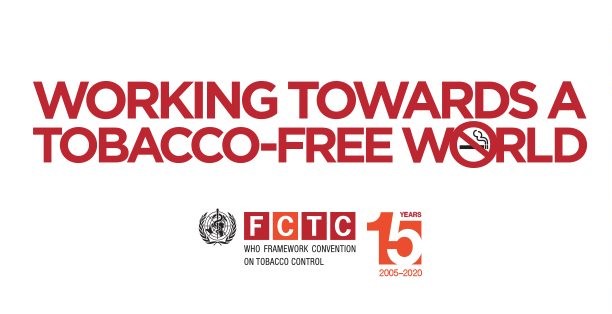Statement from the Head of the Convention Secretariat, Dr Adriana Blanco Marquizo
Tobacco control during the COVID-19 pandemic: how we can help
Today, we are facing a devastating global pandemic caused by a virus that – in just four months – has been responsible for more than 3 million confirmed cases and some 240 000 deaths.
To control the COVID-19 pandemic, reduce its tragic toll and save lives, there is a critical and urgent need for global coordination and unwavering solidarity among countries, the World Health Organization (WHO), other United Nations agencies and international organizations, communities and other stakeholders. We are all in this together, and if our actions are unified, we will get through this crisis.
The pandemic has made the world understand, perhaps as never before, the fundamental importance of health to development, the economy and every other aspect of human life. While scientists and health professionals are working tirelessly against the clock to develop medicines and vaccines to combat COVID-19, the Secretariat of the WHO Framework Convention on Tobacco Control (WHO FCTC) will intensify its efforts to support Parties to the Convention willing to work, to the extent possible, in creating a healthier environment for their populations by implementing the WHO FCTC.
We have seen that COVID-19 fatalities are higher among people with pre-existing conditions including noncommunicable diseases (NCDs) such as cardiovascular and chronic respiratory conditions, cancer, and diabetes. And we know that tobacco use is the main common risk factor linked to all of these diseases.
Tobacco use kills more than 8 million people globally every year and negatively impacts the lung health of countless others. While the science of COVID-19 is evolving, the limited evidence we have shows that smoking worsens outcomes for COVID-19 patients. And while the media has reported on research examining the relationship between tobacco use and the risk of contracting COVID 19, those studies are of variable quality and do not support a solid definitive conclusion.
The tobacco industry, as it has been stated in many high-level political fora, has an irreconcilable conflict of interest with public health. Article 5.3 of the WHO FCTC and its implementation guidelines request Parties to protect public health from the vested interests of the tobacco industry and of those who work to further those interests. However, the industry has a well-documented history of deception and of capitalizing on humanitarian crises, natural disasters and other similar catastrophic events.
Today, the tobacco industry is once again taking advantage of the vulnerable situation of many of our Parties, offering its “philanthropic help” through donations of money, personal protective equipment, ventilators and other resources, in an effort to make the industry look good and enhance its reputation.
I understand the intense moral dilemma faced by governments during these extraordinarily challenging times: on one hand, there is an urgent need and imperative obligation to save as many lives as possible; while on the other hand, there is a donor with a clear record of working against public health offering desperately needed resources that many governments do not have the means or capacity to provide for their populations.
The paradox is striking – the tobacco industry offering to help and support governments during this pandemic. Isn’t this the same industry that produces and aggressively markets an addictive product that kills up to half of its users? Isn’t this the same industry whose products lead to an increase in the incidence of NCDs that, in turn, worsen outcomes of COVID-19 patients?
We can expect the tobacco industry to follow its usual game plan by claiming it provided significant support to governments during the pandemic but then pressuring or interfering with the efforts of those same governments to strengthen tobacco control.
During this pandemic, I wish to remind all Parties that there has never been a more appropriate time to support your citizens in their efforts to quit tobacco use. We also need to protect, to the extent possible, the advances we have made in tobacco control, even in difficult times such as these. To help Parties accomplish these goals, the Convention Secretariat is ready to support those who are willing to implement or enhance tobacco control regulations and to build a healthier environment for their populations.
Let us all remember that smoke-free environments; prominent health warnings on tobacco packages or even plain packaging; a ban on all forms of tobacco advertising, promotion and sponsorship; and last, but certainly not the least, increasing taxes and prices on tobacco products are fundamental parts of the WHO FCTC. These have been defined by WHO as very cost-effective measures to prevent and control NCDs and can be implemented even in resource-constrained environments.
On the issue of resource constraints, raising tobacco taxes has proven to be the most effective individual measure to help reduce tobacco consumption, prevent future illness and save lives. Tobacco taxation also increases sorely needed revenues for governments, avoids future health-care costs and eases the burden on health-care systems. I, therefore, believe that now is the best time to think about increasing tobacco taxes, especially in light of resource constraints and the negative health consequences of tobacco use.
During these difficult times, I would like to reiterate my support to our Parties and to extend my personal gratitude to all essential workers around the world for putting their own lives at risk to provide for the basic needs of their communities.
Link to the statement:- https://www.who.int/fctc/secretariat/head/statements/2020/tobacco-control-during-covid-19-pandemic/en/



